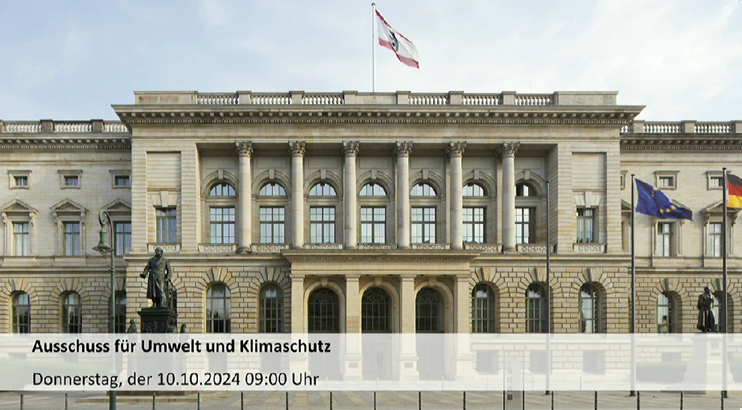"Climate neutrality in Berlin and Brandenburg is only possible together" - Prof. Hirschl in the Berlin House of Representatives
In order to become climate-neutral, the states of Berlin and Brandenburg must work closely together in the metropolitan region. From regional electricity and flexibility to the circular economy, bioeconomy and food transition, both states should use their structural differences and advantages to their mutual advantage and also create infrastructural synergies, for example in the areas of energy, housing, transport, digitalisation and water. This was the conclusion drawn by Professor Bernd Hirschl (IÖW and BTU) as an invited expert at the hearing "Climate crisis and climate future: scenarios for the Berlin-Brandenburg region" in the Environmental and Climate Protection Committee of the Berlin House of Representatives on 10 October 2024.
Under the title "Climate protection in Berlin and Brandenburg - synergy and cooperation potential in the metropolitan region", Hirschl presented the core results of the climate protection scenarios for both states, for which he is the main author and project manager. The long-term scenarios for the state of Berlin developed by Hirschl together with co-authors in the study "Making Berlin Paris-compliant" (in German language) provide important orientation for politics and business and laid the foundation for the current Berlin energy and climate protection programme and the sector targets that have been submitted to the Berlin House of Representatives for approval. The examiner's report on the Brandenburg climate plan (in German language), also led by Hirschl, provides a scenario that forms the basis for the current greenhouse gas reduction and sector targets for the state of Brandenburg. Both scenarios are thus already firmly embedded in the political planning - and in both, the examiners have taken the respective other federal state into account.
Technological solutions are predominantly available - co-operative solutions are required in many areas
Hirschl showed that primary energy consumption must fall significantly in Berlin's long-term scenario and that energy sources will be distributed across many different sources by 2050, moving away from mineral oil and gas. To achieve this, existing technologies will be used: "The future will be characterised by technological solutions that we are already largely familiar with today," said Hirschl, emphasising the important role of cooperation between the federal states in the energy transition, for example in geothermal energy and waste heat utilisation, hydrogen production and a carbon management strategy. Hirschl also calls for nationwide framework conditions that enable more regional solutions and business models, for example in the area of energy sharing, as well as joint heat planning in the border region.
Freeing up land for transformation by reducing meat consumption
Both federal states are planning to achieve climate neutrality by 2045, but as Berlin's demand is also causing residual emissions in industry and agriculture in Brandenburg, a joint reduction strategy is necessary. Hirschl emphasises that a lower demand for meat can be a simple key to this: "Every one per cent less demand for meat frees up land that is available for a wide range of applications," says Hirschl. Establishing a regional, organic and plant-based diet could help to free up land for renewable resources and Renewable Energy. The rewetting of moorland areas could also be implemented more easily if biomass and other renewable energies were produced there and theCO2 sink was remunerated.
Implement the BEK and climate plan urgently and tap into synergies
The discussion with the MPs centred primarily on the question of how the transformation process should be implemented and structured. Hirschl emphasised that although renewable energies already cover 56 percent of the nationwide electricity grid, the transformation process is still progressing too slowly, partly due to the crises. Nevertheless, a lot has been set in motion: "In this legislative period, more has been initiated at federal level than ever before in terms of the energy transition and climate protection. And this will have an impact, as will the globally supporting trends," said Hirschl, adding that in addition to the rapid political implementation of the BEK in Berlin and the climate plan in Brandenburg, it is now crucial to focus on the potential for synergies and cooperation. It is also important to focus on a fair distribution of costs, burdens and benefits in the political process in order to gain more acceptance and initiative.
~~~~~~~~~~~~
More information:
Contact us
Management regionaler Energieversorgungsstrukturen
T +49 (0) 355 69-4410
bernd.hirschl(at)b-tu.de

